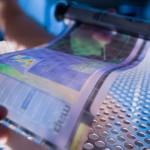Non-Invasive Deep Brain Stimulation Could Be Major Advance in Treating Parkinson’s Disease and Other Neurogenic Disorders
Posted on October 7, 2011 by Jeffrey Newman
 When I first started reading about non-invasive deep electrical stimulation of the brain for memory improvement and treatment of various neurogenic diseases, I thought that this is still the stuff of science fiction. Now I am not so sure. New research is worth examining. Deep brain electrical stimulation has been used to treat the symptoms of Parkinson’s Disease for long enough that for the right patients it is now a reliable and valuable therapy to halt tremors. Although highly invasive, the safety record at the medical facilities doing the procedures a lot is quite good. Now, a new study published in the September 21 issue of The Journal of Neuroscience shows that deep brain stimulation may lso serve to improve cognition. Dr. Paul Frankland PhD and his colleagues at The Hospital for Sick Children found that one hour of electrical stimulation of the brain’s learning and memory center in adult mice led to a two fold increase in new cells in the hippocampus. the brain’s learning and memory center. Now here’s the interesting connection and perhaps the leap: much work is now being done on the use of non-invasive brain stimulation. In a study published in the June 2011 issue of Neuroimage, when a weak electrical current was applied over the front of the participant’s scqalp for ten minutes, it greatly improved their ability to control impulsivity. In another research study, Dr. Alexander Rotenberg M.D. PhD Assistant Professor of Neurology at Children’s Hospital in Boston used a non-invasive magnetic coil to apply deep brain stimulation and found that. No findings have been published but apparently this tool shows high promise in animal studies. A company developing the technology called Brainsway Ltd. suggests that this may be leading to new forms of treatment for a wide range of neurological disorders incling Alzheimer’s disease, autism, depression and Parkinson’s disease. So far, I have found no studies which explain in any detail the reason why this works or the mechanism of action but I am just starting to look more closely. Given the progress of deep brain stimulation via brain surgery and implantation of electrodes, if targeted stimulation can be accomplished, this would seem a logical arena of focus in those diseases that are most opaque and especially Alzheimer’s Disease which is so elusive and increasing at such a rapid rate. Stay tuned. If the methods are found to be safe, I could envision the potential use for cognitive learning enhancement in the general population, for example the medical student pressing the limits of their learning and memory.
When I first started reading about non-invasive deep electrical stimulation of the brain for memory improvement and treatment of various neurogenic diseases, I thought that this is still the stuff of science fiction. Now I am not so sure. New research is worth examining. Deep brain electrical stimulation has been used to treat the symptoms of Parkinson’s Disease for long enough that for the right patients it is now a reliable and valuable therapy to halt tremors. Although highly invasive, the safety record at the medical facilities doing the procedures a lot is quite good. Now, a new study published in the September 21 issue of The Journal of Neuroscience shows that deep brain stimulation may lso serve to improve cognition. Dr. Paul Frankland PhD and his colleagues at The Hospital for Sick Children found that one hour of electrical stimulation of the brain’s learning and memory center in adult mice led to a two fold increase in new cells in the hippocampus. the brain’s learning and memory center. Now here’s the interesting connection and perhaps the leap: much work is now being done on the use of non-invasive brain stimulation. In a study published in the June 2011 issue of Neuroimage, when a weak electrical current was applied over the front of the participant’s scqalp for ten minutes, it greatly improved their ability to control impulsivity. In another research study, Dr. Alexander Rotenberg M.D. PhD Assistant Professor of Neurology at Children’s Hospital in Boston used a non-invasive magnetic coil to apply deep brain stimulation and found that. No findings have been published but apparently this tool shows high promise in animal studies. A company developing the technology called Brainsway Ltd. suggests that this may be leading to new forms of treatment for a wide range of neurological disorders incling Alzheimer’s disease, autism, depression and Parkinson’s disease. So far, I have found no studies which explain in any detail the reason why this works or the mechanism of action but I am just starting to look more closely. Given the progress of deep brain stimulation via brain surgery and implantation of electrodes, if targeted stimulation can be accomplished, this would seem a logical arena of focus in those diseases that are most opaque and especially Alzheimer’s Disease which is so elusive and increasing at such a rapid rate. Stay tuned. If the methods are found to be safe, I could envision the potential use for cognitive learning enhancement in the general population, for example the medical student pressing the limits of their learning and memory.
Comments (1)

Sir, I am doing BSc in Electrical And Electronics Engg. I’m from Bangladesh. I want to do my final year thesis on non-invasive Deep Brain Stimulation. I’ll start working on it after gathering some required information on it.
If you provide further information on it, then it’ll be a great help.
Thank you.